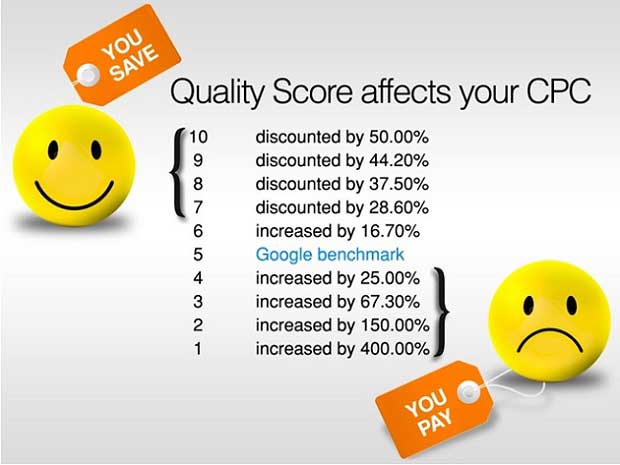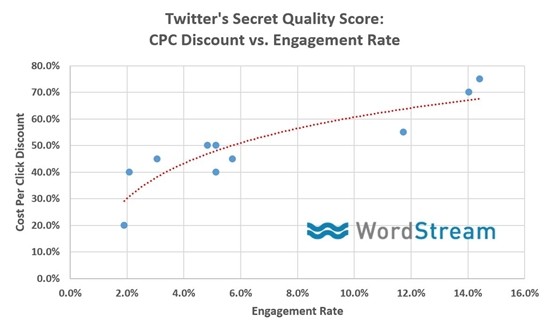A few weeks ago, I shared with you six stupid marketing metrics that need to die. The response of readers was overwhelming.
Dozens of marketers reached out here at MarketingProfs and on Twitter and asked variations of the question in the following comment:
I love the topic, Larry. Your article is really clever and has finally put the nail in the coffin on page rank for me. (I didn't want to let that one go!). I'd love to hear what marketing metrics you think matter most.
So, then, just which metrics should we be focusing on?
In this article, I'll share with you what I believe are the most important metrics for the Holy Grails of Internet marketing channels:
- PPC marketing
- SEO/content marketing
- Social media marketing
I'll also share what I believe to be the most important marketing metric of all time.

May they live on in our performance measurement arsenal forever and ever, amen.
1. AdWords Quality Score
In researching literally thousands of AdWords accounts, I've found that the biggest determinant for advertiser success or failure is Quality Score (QS).
So what is it?
Quality Score is Google's rating of the quality and relevance of your keywords and PPC ads.
As with its search algorithm, Google likes to keep things somewhat secret and confusing, but I've reverse-engineered Quality Score, and I can tell you that it's essentially based on beating the expected click-through rate (CTR) for a given ad position.
Why is CTR such an important factor in Quality Score? Simply, how people react to your ad is Google's best way of gauging quality and relevance. If it's not resonating, it's not going to get clicks.
So Quality Score is Google's assessment of your ad quality. That's huge. You might not know that it determines…
- Your Ad position
- Impression share (Every +/- change in QS results in a +/- 9% change in Impression Share!)
- Cost per click (CPC)
And so, QS determines the quantity and cost of your conversions. That's why I view Quality Score as—hands down, without a doubt—the most important metric in PPC.
Just how important is QS? Well, do you like paying more money for the same ads? Consider this:

That's right, Google actually gives advertisers with high QS a click-cost discount, while those with lower than average scores get fined for lacking quality and relevance. And Quality Score applies to the Google Display Network, too!
Be sure to avoid these four common mistakes that drag down your CTRs—and, therefore, your Quality Score. Also check out the following:
- "What Is Google AdWords? How the AdWords Auction Works" [Infographic]
- "The Top 10 Best PPC Hacks... Ever!"
- "Revisiting the Economics of Google Quality Score"
2. Social Media Post Engagement Rate
All of the major social networks focus to some degree (some more than others) on putting the most relevant content in front of users in the news feed or activity stream.
Across the board, one of the major factors in helping them rank which content to display is engagement, which tells them in real time whether your content is resonating with others.
We know what Facebook's News Feed algorithm places great weight on post engagement, such as gaining likes, comments, and re-shares. Each interaction acts as a sort of endorsement for the quality and relevance of your post, resulting in the post's being shown in News Feeds more often.
So a huge key to Facebook success is to do everything you can to get those engagement rates up.
Over on Twitter, engagement also plays a big role in gaining retweets but also in paid impression share and cost per engagement if you're doing paid, promoted tweets.
That fact isn't published anywhere, but my own research has found that Twitter Ads has a type of Quality Score of its own to ensure advertisers are rewarded for quality ads and great targeting. High-engagement tweets get far cheaper clicks and much more impression share.
High engagement tells the social networks, whether you're doing organic or paid social media marketing, that your post is worthy of being seen by more people.
Focus on getting your engagement up to get more eyes on your content!
3. Engagement Metrics in Content and SEO
Are people loving your content or not? Engagement metrics such as bounce rate, average time on site (as seen below), comments, and social shares all point to how effective you are at engaging your readers.
The future of SEO and organic search will have a lot to do with user engagement metrics, as links have become less and less a reliable metric for ranking content.
Did you notice that all three types of metrics so far have to do with how people respond to your ads, social media posts, and content? Why is that?
Marketing is no longer about trying to trick users with annoying tactics or fooling search engines into thinking your stuff is popular. Now it's about trying to provide the best possible answers to questions and delighting the people who come in contact with your brand—whether via search, social, or your content.
The best way to make people want to buy from you is to earn their trust and respect first (and, in that respect, if you think back to the days of mom and pop shops and brick and mortar stores, not much has changed in how you earn trust!).
4. The Most Important Marketing Metric of All Time: Actual Revenues
We often think of revenue as the end goal, but it's an important metric in and of itself.
All of the other things we look at are really just proxies for sales we hope we're making at some point down the line; if those sales aren't going up, it doesn't really matter how fancy our marketing efforts are, how long people stay on site, how engaged they are, etc.
If revenue isn't growing, something in the marketing mix is broken.
It's totally OK to take a longer view here since content doesn't convert to leads and sales right away, but always keep your eye on the prize and consider revenue as your most telling metric of all.






